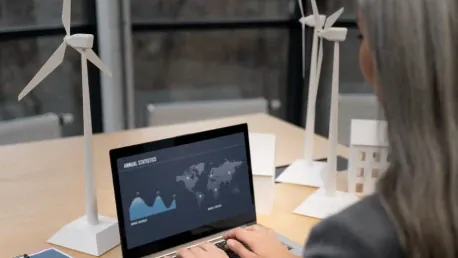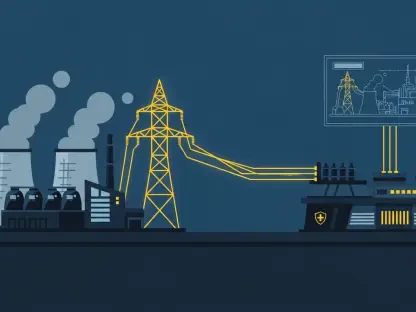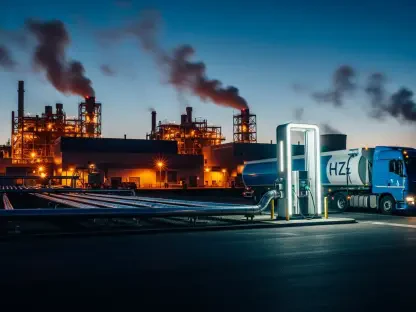As cities worldwide continue to expand and urban populations surge, managing energy consumption becomes increasingly complex and pressing. Integrating Internet of Things (IoT) technology into urban infrastructures presents a promising solution to this growing challenge. IoT enables the real-time monitoring and management of energy resources, providing cities with the tools to make data-driven decisions aimed at optimizing utility services. This transformation is crucial for smart cities striving to enhance energy efficiency, improve sustainability, and cater to the dynamic needs of their inhabitants.
Enhanced Energy Consumption and Distribution
The advent of IoT devices, such as smart meters and connected sensors, has revolutionized the way energy consumption is monitored and managed in urban areas. These devices facilitate real-time data collection on electricity usage, allowing utility providers to adjust energy distribution in response to peak demand periods. The transparency offered by smart meters benefits both providers and consumers. Providers gain insights into consumption patterns, enabling them to balance supply and demand more effectively, whereas consumers can monitor and track their energy usage, fostering a more conscious approach to energy consumption.
IoT technology isn’t limited to monitoring electricity usage alone; it also influences lighting systems in smart cities. IoT-equipped lighting systems can dynamically adapt to changes in traffic and weather conditions, leading to significant reductions in electricity expenses while maintaining roadway safety. For example, streetlights can dim during periods of low traffic or brighten in response to worsening weather conditions. This ability to adjust lighting based on real-time data ensures that energy is used efficiently without compromising public safety. As a result, cities can reduce their overall energy consumption and lower operational costs.
Optimization of Utility Services
IoT’s capacity to collect and analyze massive datasets empowers urban planners to make informed decisions about resource allocation and investments in renewable energy infrastructure. Predictive analytics, made possible through IoT, can forecast future energy demands, enhancing the reliability and resilience of urban energy grids. By anticipating peak periods and potential shortages, cities can ensure a consistent and reliable energy supply, reducing the risk of blackouts and minimizing disruptions to daily life. This proactive approach to energy management is vital for maintaining the stability of growing urban environments.
Advanced demand response programs, enabled by IoT technology, play a critical role in optimizing energy usage. These programs can automatically reduce non-essential power usage during peak hours, effectively ensuring energy availability during times of high demand. This not only helps alleviate stress on the energy grid but also reduces cities’ dependence on fossil fuels. By shifting energy consumption patterns, IoT-driven demand response programs contribute to a more sustainable and efficient energy landscape. This capability is particularly important as cities strive to meet ambitious climate targets and transition towards greener energy sources.
Improved Utility-Customer Interactions
Revolutionizing the interaction between utility providers and customers is another significant impact of IoT within smart cities. Automated billing systems, which leverage IoT data, offer a seamless customer experience by analyzing payment history and usage behaviors. These systems can tailor billing and payment plans to individual preferences, meeting the growing demand for personalized interactions. Consumers benefit from more accurate and timely billing, while utility providers can reduce administrative burdens and improve overall customer satisfaction.
The tailored approach provided by IoT-enhanced billing systems extends beyond just payments. It also includes proactive communication regarding energy consumption, highlighting areas where customers can reduce usage and save on costs. By empowering consumers with detailed usage data and actionable insights, IoT fosters a more collaborative relationship between utility providers and customers. This partnership is essential for fostering energy conservation habits and encouraging responsible energy use. As consumers become more engaged and informed, they are more likely to adopt energy-efficient practices that align with broader sustainability goals.
Sustainable Urban Living
Sustainability is a cornerstone of smart city initiatives, and IoT plays a pivotal role in achieving long-term environmental objectives. IoT optimization minimizes unnecessary energy use, enhancing resource efficiency and significantly lowering carbon emissions. The data collected by IoT devices inform substantial regulations on sustainable energy practices, guiding cities toward greener operations. For instance, integrating renewable energy sources like solar and wind power into existing grids is facilitated by IoT technology. IoT devices ensure a balanced supply, support decarbonization efforts, and amplify the benefits of renewable energy.
IoT’s impact on sustainability extends to the burgeoning electric vehicle (EV) infrastructure. By supporting the development of smart charging networks, IoT enables more efficient management of EV charging stations, ensuring that electric vehicles can be charged without straining the energy grid. This capability not only promotes the adoption of EVs but also contributes to the broader goal of reducing carbon footprints in urban areas. Furthermore, IoT aids in the efficient management of other critical urban resources, such as water and waste, further enhancing the sustainability of cities.
Broader Influence on Urban Planning
As cities around the globe keep growing and urban populations continue to rise, the task of managing energy consumption becomes more intricate and urgent. One effective way to handle this escalating issue is through the integration of Internet of Things (IoT) technology into city infrastructures. IoT allows for the real-time monitoring and management of energy resources, equipping urban areas with valuable tools to make informed, data-driven decisions to optimize utility services. This transformation is vital for the development of smart cities, which aim to boost energy efficiency, enhance sustainability, and meet the evolving demands of their residents. By leveraging IoT, cities can not only control energy usage more precisely but also anticipate and respond to potential issues before they become severe problems. This leads to not only more efficient energy utilization but also a reduction in costs and environmental impact. As urban areas continue to expand, the implementation of IoT is becoming increasingly important for fostering sustainable and resilient communities fit for the future.









